[Original by Yuka WATANABE & Haruka SHIMIZU, 2015 Public Relations Intern (November 12, 2015); Translated by S. Thapa/Y. Nakamura/A. Guermont]
Hello, I am Yuka Watanabe, PR intern. The second staff member for our interview is Mr. Takatoshi Hasebe, the Secretary General . What is a secretary general of NGOs like? I would like to thoroughly examine it.
Mr. Hasebe has long been involved in Afghanistan as a local representative and is currently working at the Tokyo office. It is now difficult for Japanese to enter Afghanistan on account of security issues, so I expect to learn from him a lot of things about the country.
Why did you start working in the field of international cooperation?
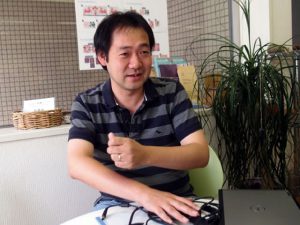
Due to his experiences of having contact with foreigners living in Japan in his student days, Mr. Hasebe decided to be involved in regional development. He took a straight road to international cooperation after his decision! I felt his strong determination despite his mildly smiling face. (Y.W.)
Frankly speaking, when I entered university, I didn’t know yet what I wanted to do in the future. When I was a second-year student, I started volunteering for foreigners living in Japan according to my teacher’s guidance. It was to teach Japanese language or make legal advice to foreigners, who had come to Japan to earn a bigger income than they had in their home countries like Southeast Asia, Iran, and South America. By doing this I learned a lot regarding their difficult experience in their home countries. All of them had no choice but to work away from their home for economic reasons etc…
Thereafter, I became interested in various places in the world, and when I was a third-year student, I visited a few NGOs in Thailand. I found that there was a difference in the way of thinking about working in both countries. I realized that there were various ways of thinking in the world.
While continuously doing volunteer activities in Japan after coming back from Thailand, I met many persons from various countries. There were people who had left their home to work in small factories or large enterprise in Japan. I also met an Iranian who had taken part in the war between Iran and Iraq. My experiences in these activities were absolutely valuable. I realized that “each person has a different world.” Although it was volunteer work teaching foreigners living in Japan, I learned more things than what I taught them. Looking back now, the experiences at that time were intimately connected with my present wish to be involved in regional development. That is why I decided to study international cooperation in a postgraduate course in UK after graduating from university.
Why did you choose international cooperation as your occupation?
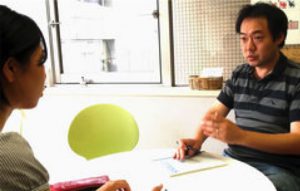
His eyes are very serious during the interview!
The starting point was that I wanted to build a society where people would not be controlled by someone else but could act on their own initiative. Following my experiences as a student, I wanted to do grass-roots activities and work in a position close to local residents. And I did my best to see matters from their point of view.
Of course, I could choose to be involved in this kind of activities as a donator, member, or volunteer, but I really wanted to work by myself and to be directly involved. There was no other choice. I got married with my wife when I was a student, and we had a child at a young age. I got, and still get, a lot of support from my family. This support from my family has helped me to make international cooperation my job.
I heard JVC was recently dealing with “work-life-balance improvement”. How do you think of it as the secretary general ?
To tell the truth, I started feeling my limitations three years after having started to work for JVC. I was worried about how low my level of knowledge remained. At that time I couldn’t say it to anyone else but was in great distress with myself.
When I worked in Afghanistan as the local representative, I caught acute hepatitis due to contaminated water or food. I was faintly conscious for two or three days and thereafter hospitalized for a few weeks. Even in such a situation, however, I couldn’t stop thinking about the project. Looking back now, I wonder if I was unbalanced. I was solely engaged in work, and was too busy to get worried about other things including my health.
I have attempted too much and made many mistakes in my young days (laughing). Nevertheless, it is because of these experiences that I can better relate to each member of our staff. I wonder if everything would be based on one’s experience. If you work in NGOs, how can you keep yourself healthy in dangerous areas both physically and mentally? I think this matter is absolutely important. Most of JVC’s staff members are serious (laughing) and inclined to overwork. It is now the time to consider work-life-balance in order to maintain our activities as an organization. I personally keep in mind to rest well and play with my children on holidays while staying in Japan.
Do you think the knowledge of foreign languages is essential in order to work in NGOs?
I don’t think that foreign languages are really essential. It depends on what kind of job you do as a staff member. If you work in Japan, you may not use foreign languages so often. On the other hand, in an overseas office you had better speak its local language. I cannot speak foreign languages so well (laughing). When I was in Afghanistan, I was very poor in speaking Pashto and other local languages. Hence I only used English in e-mail and in Skype. It turned out that staff members, not me, improved their language skills, and we could communicate in English with no problem.
Before Afghanistan, I was working in Cambodia for another NGO. At that time I learned few words of greeting in Khmer. This made local persons absolutely happy, saying, “You used our language!” If you are collaborating with persons of the so-called poorest countries, it is better if you can speak their regional languages. If you were able to understand a delicate nuance, it could facilitate mutual understanding. As there are various opinions among villagers, it is better if you could pick up what someone murmurs. Regarding languages, English would be essential at least in case of working overseas.
However, you should not stick to languages too much. The important things are “personality”, “humanity”, and “character” in order to conduct international cooperation. You would be often tested as a human than by your techniques and knowledge. This is because of the job of NGO, which directly connects a person with a person. We have to do our best to understand the people’s expectations. It is essential that you could accept each one’s values.
Finally, could you show us your favorite picture?
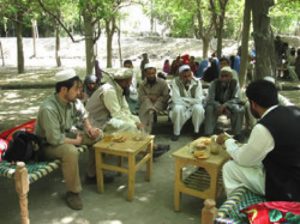
The photo was taken when he was a staff member in Afghanistan before assigned to the Secretary General.
This is a scene of attending a meeting with elders in an Afghan village. I wore the same costume as theirs so that I could mix well in the local culture and elders. I miss that time. Mixing in the local culture is very important to build trustworthy relationship with people and to ensure my safety.
[My impression after the interview]
Mr. Hasebe has been dedicated to international cooperation since his student days. I adore him, and I think it is splendid that he made the best use of his troubles and experiences up to now. Nobody may easily do the same thing as he did. I think Mr Hasebe has a strong sensitivity and interest for everything.
Although he has a mild demeanor and tone of voice, Mr. Hasebe has a strong determination. I think he actually proves by himself that “humanity and character are most important if one works in international cooperation”.
[Notice for the next interview!]
We are going to interview the next staff member, who, as Mr. Hasebe tells, is “sharp, clever, and has a way of thinking logically by making abstract matters into letters or diagrams.” Mr. Hasebe drew a portrait as requested. Glasses may give you a hint? Please don’t miss the next interview!
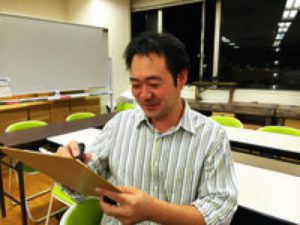
Mr. Hasebe was drawing the portrait, a bit annoyed and said, “I am very poor at drawing…”
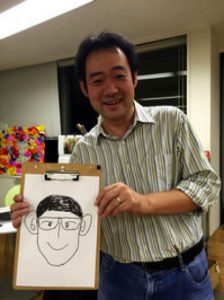
“Ah, I am too embarrassed by this portrait”.
Share This:
